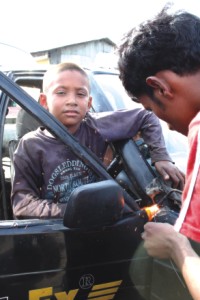|
May Day Special
Stolen Childhood
Hana Shams Ahmed

Many kids risk serious injury while at work |
Two weeks ago there was a shocking news report about the brutal murder of a 56-year-old writer. The 23-year-old murderer was a nephew of the woman, and reports allege that he was a drug addict and came to his aunt looking for money. When he was refused, he went ballistic and murdered her. The whole incident was witnessed from the beginning by one person-- an eight-year-old girl, called Momota. News cameras caught her describing in gory detail every step of the murder, and finally the murderer running away and warning the girl of dire consequences if she spoke about it to anyone.
How is Momota related to anyone in the house? She's not. She used to work as a 'bandha' (derogatory term for full-time employment) maidservant of the house. This is now such a common phenomenon that we have even stopped raising our eyebrows at it. Aunties try to justify this by saying that with the advent of the garment factories it has become increasingly difficult to employ adults to work in the house. Not that adult homeworkers have any better bargaining power in a house, where they hardly get to see daylight. But a child, an eight-year-old, or even younger sometimes, is utterly helpless.
This Labour Day, when thousands of workers around the world are recognised for the

A young apprentice learning to be a mechanic, his hand dangerously close to the welding machine |
hard work they do, when most workers get a day off to celebrate their own contribution, these children will still be waking up early in the morning, mixing the dough to make ruti for everyone in the house, sweeping the floors, and getting the cold, leftover dinner at the end of the day. The 7.9 million economically active children (according to the National Bureau of Statistics 2007 report) around the country often work harder than their adult counterparts, but because they are not recognised as workers, they do not get any benefits. Nor do they get to demand their rights to food and education. Eventually they get trapped in a vicious cycle of low skill, low income and low education which pushes them further down the poverty index. No less than 1.3 million children are involved in extremely hazardous work which ranges from working in biri (tobacco) factories, tanneries, waste collection, scrap metal shops, glass factories, motor garages, welding shops etc. In fact, UNICEF and the International Labour Organisation (ILO) have identified 47 different forms of hazardous labour that children are involved in.
Bangladesh signed the UNCRC (United Nations Convention on the Rights of Children) in 1989. The convention gives children and young people over 40 substantive rights. These include (and they apply to all children and young people without discrimination) the right to:
-Special protection measures and assistance
-Access to services such as education and health care
-Develop their personalities, abilities and talents to the fullest potential
-Grow up in an environment of happiness, love and understanding
-Be informed about and participate in achieving their rights in an accessible and active manner.
But for the seven-year-old boy breaking bricks in the harsh summer sun 12 hours a day, or the six-year-old girl dodging reckless drivers to sell popcorn bags, this information is irrelevant. Children working and living on the streets are vulnerable to exploitation and violence and often end up in a life of crime -- pick-pocketing, begging, selling drugs and pilfering. An eight-year-old girl was arrested on May 23 on charges of carrying twenty bottles of Phensidyl (strapped to her legs and waist) and the court ordered her to be sent to jail. Apongaon, a rehabilitation centre for drug addicts has about 140 patients, out of which around 40 are children under the age of 14. Most of these kids were led into the world of crime and addiction simply by older drug peddlers, for whom it is convenient to 'use' children to do dirty work.
The 'safety' of four walls does not really make children working inside homes any safer. According to a UNICEF sponsored study (Situation Analysis of Child Domestic Workers in Dhaka, 2005), 147,943 child homeworkers exist in Dhaka alone. According to an ILO-IPEC (International Labour Organisation-International Programme on the Elimination of Child Labour) survey in 2006, the number of homeworkers in Bangladesh aged 6-17 years is estimated to be 273,543. Seventy percent are between 12-16 years and 30 percent are between 6-11 years. Ninety-four percent are full-time 'bandha' workers and six percent are part-time 'chuta' workers. Seventy-eight percent of the estimated 421,426 child workers around the country are girls. The remuneration for this kind of 24-hour job ranges from only food and minimal clothing to 500 takas a month. The perks include harsh words for every small 'mistake' to beatings, sexual abuse and even death. And according to Ain O Salish Kendro, no employer has ever been sentenced for killing a homeworker.
Labour Day is a celebration for workers around the world. Theoretically, children should not be part of that celebration, because they should not be workers. But completely eliminating child labour from the country is not happening any time soon. Bangladesh lacks legal and institutional framework necessary to adequately address the plight of child workers. But tentative first steps can be taken to stop all hazardous labour and legally enforce accountability for those who abuse child workers. Employment opportunities (for adults) have to be increased so that children are not forced to work to make ends meet for their family. These first steps can hopefully lead us to eventually ensuring that children are playing and getting an education, not working to earn a living.
Copyright (R) thedailystar.net 2008 |
